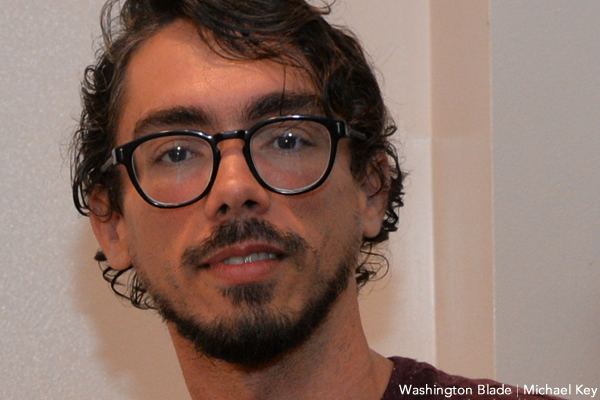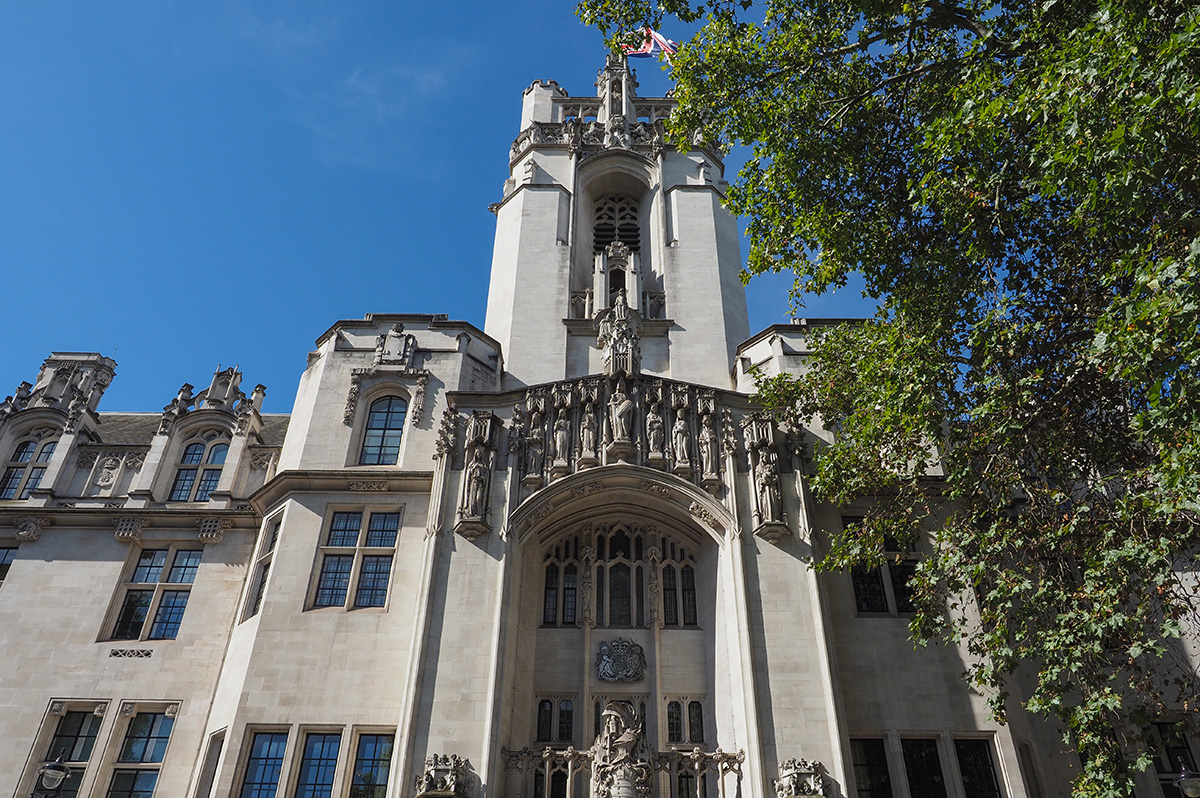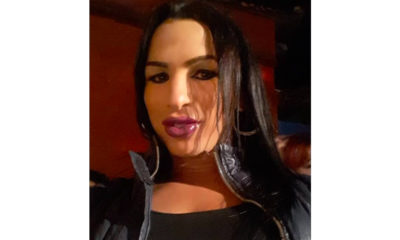World
Cuban police violently arrest Blade media partner’s editor
Maykel González Vivero taken into custody during Havana protests

Cuban police on Sunday violently arrested the editor of the Washington Blade’s media partner on the island.
Tremenda Nota Director Maykel González Vivero’s arrest in Havana coincided with protests against mounting food shortages, the government’s response to the pandemic and a worsening economic crisis that were taking place across the country. Media reports indicate police targeted other journalists who were covering the protests.
“It was violent, everything was over,” said González in a text message he was able to secretly send to a colleague from the police station where he was being held. “I was not resisting when they took me down and they consciously threw my glasses to fuck with me.”
A tweet that appeared on González’s Twitter page shortly after midnight on Monday confirmed he had been arrested.
“I was detained at the violent end of today’s protest in Havana,” reads the tweet.
Fui detenido tras el final violento de la manifestación de hoy en La Habana. Estoy en la unidad de policía de Zapata y C #Cuba #Protestas
— Maykel González Vivero 🎯 (@MGVivero) July 12, 2021
A thread that appeared on González’s Twitter account provided additional details of his arrest.
“I had already left the ‘battlefield’ when a police officer wearing civilian clothes shouted to me that I had been throwing rocks,” reads the thread. “I had never thrown a rock.”
“Uniformed officials handcuffed me,” it says. “They turned me over to some riot police after awhile.”
González said the riot police “bent him over and grabbed him hard by his hair.”
“They did it to punish me. There was no other reason. I never resisted,” he said in the thread.
“My glasses fell off and they constantly kicked them,” added González. “I am now writing by sticking close to the screen.”
Así me detuvieron:
Ya salía del “campo de batalla” cuando un policía de civil me acusó a gritos de haber tirado piedras.
Yo jamás he tirado una piedra.
Me esposaron unos oficiales de uniforme común. Al rato me pusieron en manos de unos antimotines.
Sigue 👇🏻
— Maykel González Vivero 🎯 (@MGVivero) July 12, 2021
A source in Cuba told the Blade on Monday that González remains in police custody.
Cuban government has previously targeted González
Tremenda Nota throughout Sunday posted videos of the protests in Havana to its social media pages, even though the government at times cut access to the internet. One video that Tremenda Nota posted to its Twitter page shows what it describes as “special troops” in Havana’s 10 de Octubre neighborhood moving towards Old Havana.
Hace solo unos minutos se avistaron tropas especiales por la Calzada del 10 de Octubre en dirección a La Habana Vieja pic.twitter.com/8b4EElXOGo
— TremendaNota_Cuba (@TremendanotaC) July 12, 2021
Tremenda Nota also reported artists and intellectuals who gathered in front of the headquarters of Cuban Institute for Radio and Television, the government agency that governs state-run media, in Havana’s Vedado neighborhood “were repressed” for “demanding a space and to tell the truth about the country.”
Artistas e intelectuales fueron reprimidos frente al Instituto Cubano de Radio y Televisión para exigir un espacio y contar la verdad del país.
— TremendaNota_Cuba (@TremendanotaC) July 12, 2021
Cuban police have previously detained González, most recently in November 2020. The Interior Ministry in late 2019 banned him from leaving Cuba.
The U.S. on Sept. 18, 2019, granted asylum to Yariel Valdés González, a Blade contributor who worked for Tremenda Nota and other independent Cuban media outlets, because of the persecution he suffered in his homeland.
The Cuban government on May 8, 2019, detained this reporter for several hours at Havana’s José Martí International Airport after he tried to enter Cuba to continue his coverage of the island’s LGBTQ rights movement. The Cuban government eventually expelled him from the country and he flew back to Miami.
United Kingdom
UK Supreme Court rules legal definition of woman limited to ‘biological women’
Advocacy groups say decision is serious setback for transgender rights

The British Supreme Court on Wednesday ruled the legal definition of a woman is limited to “biological women” and does not include transgender women.
The Equality Act that bans discrimination based on sexual orientation and gender identity took effect in 2010.
Scottish MPs in 2018 passed a bill that sought to increase the number of women on government boards. The Supreme Court ruling notes For Women Scotland — a “feminist voluntary organization which campaigns to strengthen women’s rights and children’s rights in Scotland” — challenged the Scottish government’s decision to include trans women with a Gender Recognition Certificate in its definition of women when it implemented the quota.
Stonewall U.K., a British advocacy group, notes a Gender Recognition Certificate is “a document that allows some trans men and trans women to have the right gender on their birth certificate.”
“We conclude that the guidance issued by the Scottish government is incorrect,” reads the Supreme Court ruling. “A person with a GRC (Gender Recognition Certificate) in the female gender does not come within the definition of ‘woman’ for the purposes of sex discrimination in section 11 of the EA (Equality Act) 2010. That in turn means that the definition of ‘woman’ in section 2 of the 2018 Act, which Scottish ministers accept must bear the same meaning as the term ‘woman’ in section 11 and section 212 of the EA 2010, is limited to biological women and does not include trans women with a GRC.”
The 88-page ruling says trans people “are protected by the indirect discrimination provisions” of the Equality Act, regardless of whether they have a Gender Recognition Certificate.
“Transgender people are also protected from indirect discrimination where they are put at a particular disadvantage which they share with members of their biological sex,” it adds.
Susan Smith, co-founder of For Women Scotland, praised the decision.
“Today the judges have said what we always believed to be the case, that women are protected by their biological sex,” she said, according to the BBC. “Sex is real and women can now feel safe that services and spaces designated for women are for women and we are enormously grateful to the Supreme Court for this ruling.”
Author J.K. Rowling on X said it “took three extraordinary, tenacious Scottish women with an army behind them to get this case heard by the Supreme Court.”
“In winning, they’ve protected the rights of women and girls across the UK,” she added.
It took three extraordinary, tenacious Scottish women with an army behind them to get this case heard by the Supreme Court and, in winning, they’ve protected the rights of women and girls across the UK. @ForWomenScot, I’m so proud to know you 🏴💜🏴💚🏴🤍🏴 https://t.co/JEvcScVVGS
— J.K. Rowling (@jk_rowling) April 16, 2025
Advocacy groups in Scotland and across the U.K. said the ruling is a serious setback for trans rights.
“We are really shocked by today’s Supreme Court decision — which reverses 20 years of understanding on how the law recognizes trans men and women with Gender Recognition Certificates,” said Scottish Trans and the Equality Network in a statement posted to Instagram. “The judgment seems to have totally missed what matters to trans people — that we are able to live our lives, and be recognized, in line with who we truly are.”
Consortium, a network of more than 700 LGBTQ and intersex rights groups from across the U.K., in their own statement said it is “deeply concerned at the widespread, harmful implications of today’s Supreme Court ruling.”
“As LGBT+ organizations across the country, we stand in solidarity with trans, intersex and nonbinary folk as we navigate from here,” said Consortium.
The Supreme Court said its decision can be appealed.
El Salvador
Gay Venezuelan makeup artist remains in El Salvador mega prison
Former police officer said Andry Hernández Romero was gang member because of tattoos

A new investigation points to a discredited, former police officer who played a “key role” in the wrongful deportation of Andry Hernández Romero, a gay asylum seeker and makeup artist who was sent to a maximum security mega prison in El Salvador under Trump’s Alien Enemies Act.
USA Today found in a recent investigation that the former Milwaukee police officer who filed the report about Hernández, citing his tattoos as the reason for the gang affiliation, has a long history of credibility and disciplinary issues in his former police officer position.
The private prison employee who previously worked as a police officer until he was fired for driving into a house while intoxicated — among other alcohol-related incidents — “helped seal the fate” of Hernández.
The investigation by USA Today found that the former police officer accused Hernández of being a part of the Tren de Aragua gang because of his two crown tattoos with the words “mom,” and “dad,” which are now being identified as Venezuelan gang-related symbols.
Since then, his story has made headlines across the nation because Hernández has no criminal record and is legally seeking asylum in the U.S. due to credible threats of violence against him in Venezuela because of LGBTQ persecution.
He was targeted shortly after Trump invoked the Alien Enemies Act of 1798, which is a proclamation for all law enforcement officials to “apprehend, restrain, secure, and remove every Alien Enemy described in section 1 of [the] proclamation.”
Charles Cross, Jr., the former police officer, signed the report which wrongfully identified Hernández as a gang member. Cross was fired in 2012 after many incidents relating to his credibility and how it was affecting the credibility of the department to testify in court.
He had already been under investigation previously for claiming overtime pay that he never earned. In 2007, he had also faced criminal charges for damage to property, according to court records.
In March, the Washington Blade spoke with the Immigrant Defenders Law Center Litigation and Advocacy Director Alvaro M. Huerta regarding the case and stated that “officials with U.S. Immigration and Customs Enforcement and U.S. Customs and Border Protection alleged his organization’s client was a member of Tren de Aragua, a Venezuela-based gang, because of his tattoos and no other information.”
Hernández came to the U.S. last year in search of asylum and now makes up one of 238 Venezuelan immigrants who were deported from the U.S. to El Salvador, Honduras and Venezuela. Many of those being deported are being sent to the Center for Terrorism Confinement, a maximum-security mega prison in El Salvador, which has been accused of human rights violations.
According to the investigation, the Department of Homeland Security “wouldn’t offer further details on the case, or the process in general, but reiterated that the department uses more than just tattoos to determine gang allegiance.”
His story is now being looked at as a cautionary tale of the lack of due process of law the U.S. government is taking, as the Department of Homeland Security and Immigration and Customs Enforcement ramp up deportations across the nation.
Organizations like the Human Rights Campaign are now calling for Secretary of State Marco Rubio and Secretary of Homeland Security Kristi Noem to cease wrongful deportations and return Hernández home. The petition also urges the U.S. government to afford all Americans, forging nationals and asylum seekers residing in the U.S., due process of law as required by the Constitution.
Argentina
Gay, nonbinary parent fights for family in Argentina’s courts
Leonardo Hatanaka alleges they were fired after requesting paternity leave

An unprecedented case could set an important legal precedent for the rights of labor rights for LGBTQ families in Latin America.
Leonardo Hatanaka, a Brazilian pharmaceutical professional, expects an imminent ruling from the Superior Court of Justice in the Autonomous City of Buenos Aires in a case that alleges discriminatory dismissal based on sexual orientation, gender identity, and xenophobia after their son Matteo’s birth in Argentina via “solidarity gestation.” Human rights organizations and international agencies have followed the case closely.
Genzyme de Argentina S.A. and Sanofi in 2023 fired Hatanaka weeks after they notified them of their son’s paternity and requested 180-day parental leave.
“Matteo’s birth was the realization of a dream and the right to form a family with love, dignity and equality, even if that means having to fight every day for our family to be recognized as such,” Hatanaka told the Washington Blade in an exclusive interview.
The National Institute Against Discrimination, Xenophobia and Racism, a government agency known by the acronym INADI that President Javier Milei’s administration has shut down, in November 2023 said Hatanka’s termination was motivated by discrimination based on sexual orientation and gender identity.
(Milei took office in December 2023.)
The General Directorate of Coexistence in Diversity in Buenos Aires’s government in 2024 said institutional xenophobia motivated the firing.
“I am a gay man, foreign, nonbinary, and I had requested to exercise my right to parental leave,” Hatanaka explained. “The company denied access to a basic right to care, which it does provide in other countries, and did not provide any medical coverage for our son, despite his legal registration with both parents’ names.”
Sanofi did not acknowledge responsibility, offer apologies or any kind of reparations, despite the two rulings.
“It was devastating. I was caring for a newborn, at a moment of enormous vulnerability, and the company chose just that moment to abandon us,” said Hatanaka.
The National Labor Court overturned an initial injunction that ordered Hatanaka’s reinstatement. Hatanaka appealed the decision to the Superior Court of Justice in the Autonomous City of Buenos Aires.
“I hope for justice; that the discrimination suffered is recognized, and that this ruling serves as a precedent for all diverse families and LGBTQ+ people who are seeing their rights violated,” said Hatanaka.
The Argentine LGBT Federation, SOS Homophobie in France, and Mothers of Resistance in Brazil are among the organizations that have expressed their support. The latest U.N. report on anti-LGBTQ discrimination also notes the case.
“Companies must go beyond marketing,” Hatanaka emphasized. “Real inclusion requires concrete actions, consistency, and respect for their own policies.”
Hatanaka stressed that “there are instruments such as the UN Guiding Principles on Business and Human Rights. It is time for them to comply with them.” The lawsuit has also become a symbol of the struggle for equality and protection of families with parents who are the same sex.
“I feel I represent many LGBTQ+ families who live in fear of losing everything by exercising their rights,” said Hatanaka. “LGBTQ+ parenting is legitimate, real and deserves protection. No family should be punished for existing.”
-

 District of Columbia2 days ago
District of Columbia2 days agoReenactment of 1965 gay rights protest at White House set for April 17
-

 Maryland3 days ago
Maryland3 days agoFreeState Justice: Transgender activist ‘hijacked’ Moore’s Transgender Day of Visibility event
-

 Hungary3 days ago
Hungary3 days agoHungarian MPs amend constitution to ban public LGBTQ events
-

 Real Estate3 days ago
Real Estate3 days agoNavigating DMV real estate market during political unrest










